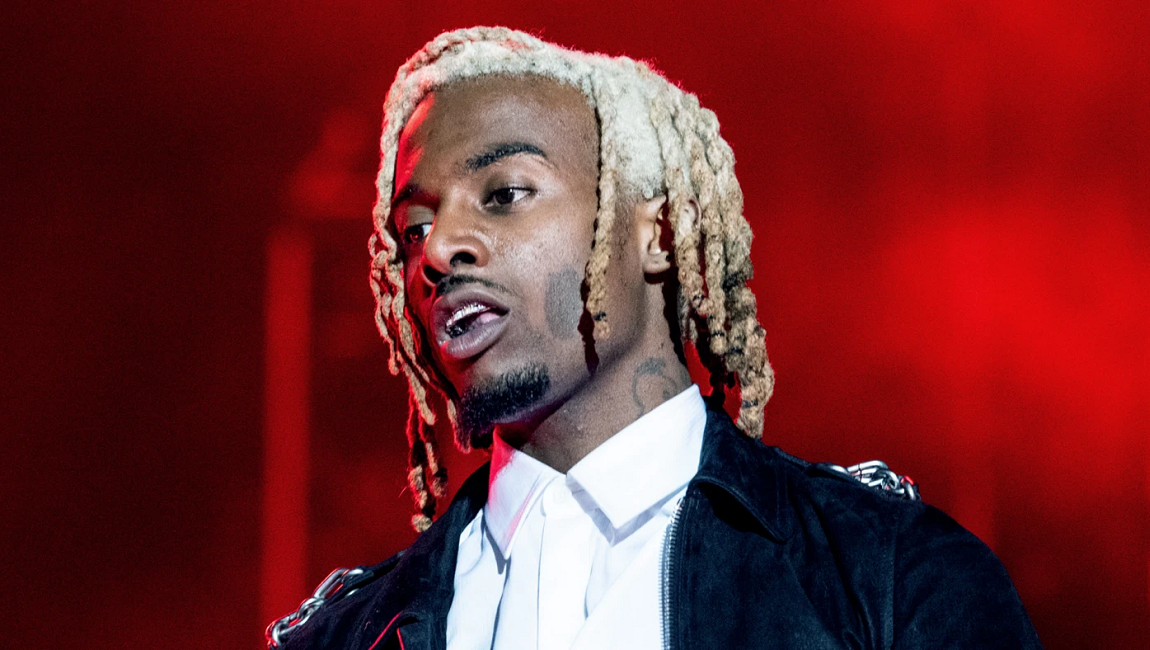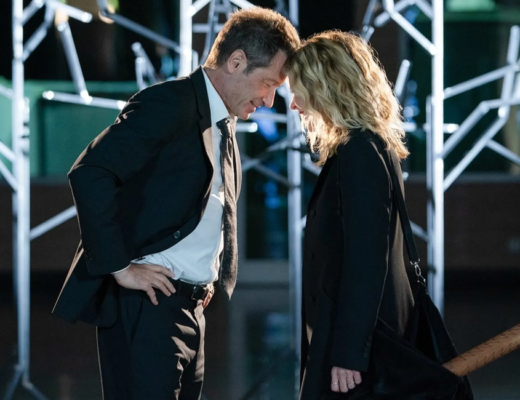Playboi Carti
Whole Lotta Red is, above all else, very cool. And as with anything cool being released into the contemporary pop landscape, Playboi Carti’s second studio album (assuming we’re still calling his 2017 self-titled breakthrough a “mixtape”) has been met with standard skepticisms vis-à-vis the validity of the rapper’s artistic license. But this is the sort of confident, free-spirited work that shrugs off such pedanticisms and makes the critical perspective look goofy. A long-awaited (by rap release standards, anyway) follow up to 2018’s Die Lit, Whole Lotta Red is marked by a structured spontaneity; free associative raps that playfully glide in and out of rhythmic sync with punky, chiptune-gesturing trap beats. Similar to friend and collaborator Lil Uzi Vert’s Eternal Atake, from the first half of 2020, Whole Lotta Red seems as if it were conceived as a musical mood board, threading together a selection of sounds and genres (here: punk, goth, video game) that have then been loosely sequenced into something that resembles a traditional studio album. Clocking in at a luxurious 62 minutes, the album fulfills the promise of its event status without breaking a sweat; indeed, if Carti is aware of the hype and expectations surrounding his sophomore effort, he never lets on. The Carti persona has gone full rock star in 2020; it’s hard to imagine him even considering, for a moment, that he could create anything less than a hit.
And so it makes plenty of sense that Kanye West would align himself with Whole Lotta Red, taking on an executive producer role (in the 11th hour of recording, apparently) alongside Givenchy creative director Matthew Williams. While the exact details of West’s contributions are vague (barring his actually tangible guest verse on the album’s second track, “Go2DaMoon,” of course), his presence is felt in the approach to production (reduced and minimal a la Yeezus) and structuring (this is, in many ways, the type of album predicted by 2016’s The Life of Pablo). Whole Lotta Red’s first half is also host to Kid Cudi and Future (who kicked off the “rock star reclamation project” that Carti is now carrying forward), and both guest spots navigate the unconventional production of the project ably enough. But the best is saved for Carti alone, with a guestless second half that asserts the rapper’s command (not only as a brazen rock star, but a vampire king too) and demonstrates the versatility of his vocal experimentation. The majority of these latter tracks forgo beats from more high profile producers in favor of close friends like Working on Dying’s F1lthy, and Art Dealer (who also designed the album art and merch). Decisions like these distinguish Whole Lotta Red from other recent high profile drops; Carti’s album is a grand pop statement that maintains a specific authorial voice.
Writer: M.G. Mailloux Section: What Would Meek Do?

Credit: Douglas Mason/Getty
Sturgill Simpson
The concept of the “greatest hits” set moved toward obsolescence in the file-sharing era and has been made all but extinct in the streaming era. Leave it to a cantankerous throwback like Sturgill Simpson to try to reinvent the form as something that’s still meaningful in 2020. Simpson has never had a hit record on the radio, but he’s certainly had albums that have sold well and have earned mainstream attention and critical and industry acclaim. Simpson revisited material from each of his albums, including his early work in the group Sunday Valley, and re-cast his proper singles, personal picks, and fan-favorite deep cuts as Bluegrass throw-downs for Cuttin’ Grass Vol.1 and Vol. 2. The former set emphasizes material that is slightly better-known, as such things go: “Life Ain’t Fair and The World Is Mean,” which was the single that first broke Simpson to a bigger audience within country music circles, is given an even more raucous arrangement, and “Turtles All the Way Down,” the unconventional centerpiece of Metamodern Sounds in Country Music, surprises for how easily it aligns with a traditional arrangement, while the rendition of “I Don’t Mind” included here has scored more airplay at AAA radio than Simpson has earned to date.
Vol. 2 focuses more on deep cuts that Simpson has claimed he was “too afraid” to include in the first batch. The highlights of the second volume are “Brace for Impact (Live a Little),” which somehow hits even harder with its new arrangement, and the feisty “You Can Have the Crown,” which Simpson gave a few lyrical edits to in order to make it even more personal. What impresses about both volumes of Cuttin’ Grass is how purposeful the song selections are: There’s a thoughtful balance between the more straightforward songwriting of his early career and the progressive, metaphor-heavy writing of his more recent output, and the result is a pair of albums that each scan as coherent in their vision. It’s a testament to how robust Simpson’s writing is that every one of these songs holds up to reinvention, and his deep knowledge of Bluegrass lends the new arrangements a real credibility. Whatever his intention with these projects may have been, Simpson made these two retrospective albums into essential and truly new additions to his catalog.
Writer: Jonathan Keefe Section: Rooted & Restless
BLACKPINK
After spending the past couple years cozying up to American mainstream listeners with In Your Area, BLACKPINK triumphantly returns with the hubristically titled The Album. Somehow still only the second most popular K-pop group in the US, they spent 2019 selling out arenas and playing to massive crowds at Coachella, solidifying the movement as culturally significant beyond heavy-hitters BTS. The pop quartet remains in ascension (at least regarding popular exposure) on The Album, a sophomore effort that boasts features from the likes of Top 40 queen bees Selena Gomez and Cardi B.
From the album’s opening moments — the swaggered declaration of “BLACKPINK in your area”— it’s clear this group (and their many producers) are aware of what they’re doing and in absolute control. Indeed, “How You Like That” is a fan service track, featuring multiple lines referencing their previous work: “Bada bing, bada boom, boom boom” is a call-back to 2016’s “Boombayah”; “Now, look at you, now look at me (Uh)” harkens back to “Kill This Love”; and “Light up the sky” is a reference to the group’s Netflix documentary by the same name. In other words, the opening track is a testament to and catalog of BLACKPINK’s major successes over the handful of years since their inception, and a cultural marker for those previously unfamiliar with K-pop groups. There are clear standouts on the record, particularly the third single, “Lovesick Girls”, featuring a raucous, earworm chorus that will stick in your head for months. “Pretty Savage” and “Ice Cream” are both likewise notable for their demonstration of the group’s stylistic versatility and vocal cohesion. The biggest failing of the album, then, is the lack of connection between the tracks themselves, as the record feels more like a quick collection of would-be singles rather than…well, “The Album.”
Still, the strength of BLACKPINK is that they are a group of artists who legitimately care about the tracks they’re putting out and the fans who are consuming them, and weaknesses easily fade under the force of their pop magnitude. As long as they continue to put together sounds that communicate what a good damn time they’re having, the girls will always be worth listening to. In that regard, The Album is no exception.
Writer: Andrew Bosma Section: Pop Rocks

Credit: Oneohtrix Point Never
Oneohtrix Point Never
The purloined production of Daniel Lopatin’s Magic Oneohtrix Point Never, “recorded”/constructed in pandemic-imposed solitude, is suffused with dizzying, sumptuous static redolent of a sibilating station of FM radio (i.e. New England’s Magic 106.7, the basis for Lapotin’s mondegreen moniker), and this static subjoins the disparate and truncated bits of sound that vacillate in and out of existence in fumes of noise. Lopatin’s patchwork panoply of snippets and songs in collision is kaleidoscopic, peaceful, and placating; it sounds like a transmission from beyond time, unmoored from any era — an epoch-eluding realm of antiquated equipment and artistic insolence for traditional form and function, where we all live alone and listen to the erratic whims of a public radio record-spinner culling from a cadre of whatever, not unlike the work of Jean-Jacques Birgé, or John Oswald (who described his defalcation as “cinemaphonically-concocted aggregates of très different but exquisitely manifest, unprecedentedly varied festerings of audio quality…”). Magic offers an eclectic array of aural stimuli: voices intoning, voices rapping, voices pleated into the tapestry, even something sort-of-like-classic-rock transmuted into something sort-of-alien-yet-familiar, in the final passages of “Lost But Never Alone” — which sounds like a song you once had stuck in your head or a line from a movie that you know, but whose title nevertheless proves elusive.
Writer: Greg Cwik Section: Ledger Line
Cam
Since releasing her well-regarded debut, Untamed, in 2015, Cam has released new music in fits and starts: Single “Diane” earned raves all the way back in 2017, “Road to Happiness” and “Redwood Tree” both failed to make any headway at country radio, and she was the featured vocalist on “So Long,” the lead single from Diplo’s country-adjacent EDM record. Ultimately, none of the music she’s released in the last five years has come anywhere close to replicating the success she found with “Burning House,” a chart-topping country-folk ballad that positioned her as a truly distinctive voice in country music. In a bit of a chicken-or-egg quandary, that lack of traction has been both the direct result of and the source of further restlessness in Cam’s aesthetic. That comes to a head on her proper sophomore album, The Otherside: The album barely scans as country music in any meaningful sense, to the extent that those kinds of genre parameters ever matter, but it doesn’t ever resolve into a singular statement of artistic voice or intent. “Diane,” a flipped-perspective on Dolly Parton’s classic “Jolene,” is included on the album and is easily the highlight of the set: Cam’s vocal turn is fiery and makes for a defiant rejoinder to having been cast as the proverbial Other Woman. It’s Cam’s singing that elevates the album: She’s able to maneuver between the enthusiasm of the love-struck feelings of “Classic” and the melancholy of “Forgetting You,” and there’s a real sense of warmth and empathy to all of her performances. That’s important, because the songwriting rarely rises above solid, and the overall production aesthetic is simply just plain. If anything, The Otherside sounds somewhat dated, like a late 1990s “folktronica” record with better engineering. Cam remains a talent worth following, but The Otherside doesn’t make it clear where she’s going.
Writer: Jonathan Keefe Section: Rooted & Restless







